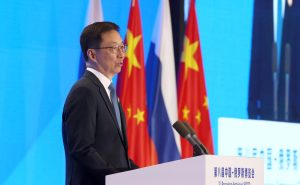Last year, after Donald Trump’s victory in the presidential election, media reported that he had extended an unusual invitation for China’s top leader, Xi Jinping, to attend the inauguration on January 20. No top Chinese leader has ever attended a U.S. presidential inauguration (in fact, foreign leaders from any country, including close U.S. partners and allies, are traditionally not invited). Typically, China is represented by its ambassador to the United States.
On January 17, China’s Foreign Ministry announced that Vice President Han Zheng will be attending instead, as Xi Jinping’s “special representative.”
“China follows the principles of mutual respect, peaceful coexistence and win-win cooperation in viewing and growing its relationship with the United States,” a ministry statement said. “We stand ready to work with the new U.S. government to enhance dialogue and communication, properly manage differences, expand mutually beneficial cooperation, jointly pursue a stable, healthy and sustainable China-U.S. relationship and find the right way for the two countries to get along with each other in the new era.”
Xi Jinping himself was always unlikely to attend. For one, he has sharply curtailed his overseas travel since the COVID-19 pandemic, generally venturing abroad only for major international summits. For another thing, the tensions in China-U.S. relations would have made such a visit awkward, with the nature of Xi’s reception somewhat in doubt. For context, Xi hasn’t visited Washington, D.C. since 2016, when he took part in the Nuclear Security Summit. For a purely bilateral visit, we have to go back to 2015. While Xi did visit the United States once each during Trump’s first term and Biden’s term, he was hosted in Florida and California, respectively – a visit outside the U.S. capital lowers the political stakes somewhat.
Instead, Han Zheng will make the trek. While the vice presidency is not a particularly powerful position in China’s hierarchy, Han personally is an influential figure; he was a member of Politburo Standing Committee, the Chinese Communist Party’s highest body, during its previous term, form 2017 to 2022. He retired from the Politburo Standing Committee at the 20th Party Congress in October 2022, and instead took up a post in the government as vice president.
Since then, Han has frequently traveled abroad to represent China at high-profile events – including the coronation of Britain’s King Charles III in 2023 and the Opening Ceremony of the Paris Olympics in 2024. Most recently, Han attended the swearing-in of Indonesia’s President Prabowo Subianto.
It’s notable that China is sending such a high-profile figure to attend Trump’s inauguration despite the hawkish signals coming from the incoming administration during the confirmation hearings for Trump’s Cabinet picks this week. Incoming Secretary of State Marco Rubio labeled China the “biggest threat” to the United States’ continued prosperity and national security. Trump’s pick for treasury secretary, Scott Bessent, expressed openness to trade talks with China, but said first the country must live up to the unfulfilled promises made in the trade deal reached under Trump’s first administration in 2020.
“China has not made good on their ag purchases for four years,” Bessent said. “If confirmed, next week I would start pushing for them to resume the purchases” – and, he added, he would discuss with Trump whether additional “catch-up” purchases should be required after China missed its commitments over the past five years.
Still, Beijing is hoping to get the relationship off to a good start. As a result, its Foreign Ministry spokespeople refrained from commenting on the confirmation hearings in their regular press conferences, avoiding a rhetorical war. But China has signaled that it will respond in kind to any action taken by the new administration, with repeated warnings not to cross its “red lines.”
The decision to send Han Zheng to Trump’s inauguration is in keeping with Beijing’s broader attempt to steady China-U.S. relations. China would not want to snub Trump by rejecting his invitation entirely, especially given the incoming president’s reputation for having thin skin and personalizing foreign relations. But having Xi attend personally was out of the question – both because of the general state of China-U.S. relations and because Xi has never attended any foreign leader’s inauguration. Even when President Vladimir Putin of Russia, was sworn in to a new term in May 2024, Xi waited until the next week to pay a visit to his “dear friend.”
Sending a vice president is an acceptable compromise – and one that helps insulate Xi from the fallout should Trump implement some of his promises on China immediately after taking office.
































